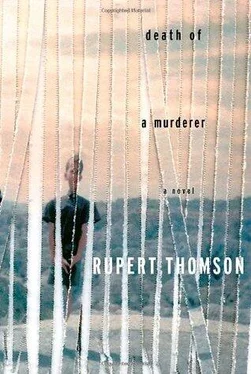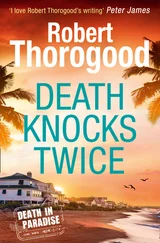“What am I supposed to do with it?”
“Wear it. You can put it round your neck, under your uniform.” She smiled at him. “No one will know it’s there.”
“All right.” He passed the cord over his head.
“It doesn’t absorb the bad things,” Sue said, “it repels them. It doesn’t let them get too close.”
“OK,” he said.
As he tucked the stone down inside his collar, he was reminded of something he had read about the early years of the woman’s imprisonment, in Holloway. Apparently, the guards used to argue over who was going to take her meals in to her. No one wanted to do it. They didn’t like the idea of being near her. They weren’t physically afraid of her; the fear was spiritual.
“One more thing.” Sue brought a second stone out of her pocket. “You’ll need to carry this as well.”
He took it from her. It was lighter in colour, and much smoother. More pleasing. “What’s this one?”
“Celestine. It complements the jet. It will put you in touch with the purest part of yourself.”
He slipped the crystal into his breast pocket. “I hope you haven’t got any more,” he said. “I’ll never be able to get up off this bench otherwise.”
“No,” she said, almost jaunty now, “that’s it.”
He checked his watch. “You should get back, or Jan will worry.” He took his mobile out. “Why don’t you give her a call and let her know you’re on your way?” Punching in the number, he handed her the phone. The moment she said, “Jan? It’s me,” he stopped listening.
The wind picked up; trees shifted overhead. He thought about the guards, and how they were believed, at times, to have drawn lots outside the woman’s cell. He wondered what they’d used. Matches, perhaps — or keys. Yes, keys. And the tray set down on the floor, the food going cold…Had the woman known what effect she’d had on those around her? What would it be like to know that?
Once Sue had finished with the phone, he walked her back to Janet’s car. Even in the short time it had been standing there, condensation had formed on all the windows, and he went round with a packet of tissues, making sure that Sue would be able to see out. Ever since her accident, he worried when she got behind the wheel. She had crashed into the playground wall at Emma’s school, knocking down a twenty-foot section, the car rolling over and then sliding, upside-down, on to the road again. Only when he saw the car the next day, in the scrapyard, its roof savagely gouged and crushed almost to the level of the steering-column, did he realise how lucky she had been, not just to have escaped uninjured, but to have survived at all.
“Take care on the road,” Billy said. “I should be home around eight.”
She looked up at him through the half-open window, her lips black in the dim light. “Sorry to be such a nuisance,” she said, then her face seemed to clear and she gave him a mischievous grin. “At least I can still surprise you.”
“I love you,” he said. “Drive carefully.”
He watched the tail-lights until they disappeared behind the trees, then started back towards the hospital. He had been firm with her. At the same time, he had tried to tell her what she needed to hear, and she had gone away happier. But he should take her somewhere. She had a birthday coming up. Maybe then.
Will we be all right?
There are things you don’t forget. You can’t wipe them out, or pretend they never happened. You wish you could, though. God, how you wish you could. Some of them seem fairly innocuous, and yet they stick — Newman’s jibe about him lacking commitment, for instance — but others take place at the very centre of your life and alter every atom, every thought. Like the spring evening when he held his baby daughter’s hand for the first time.
Looking at her tiny red palm, he noticed a line that ran across it from one side to the other. He wasn’t sure what he was seeing, but he knew enough to suspect it wasn’t normal. Then the doctor told them.
A slow smile spread over Sue’s face. “Oh, that’s a shame,” she murmured. “What a shame.”
Almost before he was aware of it, Billy had risen to his feet and turned away. How can you be so fucking stupid? Sue, he meant. And for a moment he was afraid that he had said the words out loud. Just to have had the thought was shocking enough, though, and he stared blindly into the corner of the room. He was feeling so many things at once. Most of all, he wanted desperately to be somewhere else. A pub where no one would talk to him, or even realise that he was there. A pub where he wasn’t a regular.
“Billy?” The doctor laid a hand on his shoulder.
The air blurring around him, Billy muttered “toilet,” then he left the room.
But he hurried straight past the toilet and down the stairs. One flight, then another, legs chattering like teeth. A wonder he could walk at all. He didn’t stop until he reached the road outside the hospital. He stood on the kerb; a cold wind cut through his shirt. April the 4th. He looked at the brown sky and saw a plane up there, bits of cloud sucked into its landing lights like flung rags. He could hear the uneven rumble of the engines. “Don’t let this happen,” he was whispering to himself. “Oh God, don’t let it happen.”
He was behaving as if it were all just a remote possibility. He was acting as though he had a choice. But the world had already made up its mind. Here. This is yours. He was thirty-seven, almost thirty-eight. Sue was thirty. They’d been trying to have a baby for years.
A bus went past, its wheels surging through a deep puddle. Dirty water splashed across his trousers. Standing at the edge of the main road, he watched the water dripping off him and began to laugh.
When he walked back into the delivery room, he made sure there was a smile on his face.
“That’s better,” he said.
He leaned over Sue and kissed her. Her forehead was clammy, sour.
The doctor spoke about the baby’s heart. Billy kept on smiling. It was as if he were being photographed. Not just once, though. Again and again.
During the days that followed — and they were long days, the longest he had ever known — he thought that it was all his fault. There was something not quite right about him. A lack of clarity or definition. He locked the bathroom door and put his face close to the mirror. He studied himself for minutes on end, trying to catch a glimpse of it. The weakness, the ugliness. The fatal flaw. It must always have been there, he thought. Other people had seen it, perhaps. If they had, they’d said nothing: it wasn’t the kind of thing you could talk about. It had taken the birth of a child to establish it beyond all doubt. To bring it out into the open.
After a while, though, the blame spread sideways, and he began to see the damaged baby as a verdict on their marriage. They couldn’t have been intended for each other. They had made a terrible mistake. They’d flown in the face of nature. The sense of familiarity that he had felt at the outset had been a trick after all, a trap, and he had walked right into it, fool that he was. Or perhaps he was being punished for all the things that he had done and hadn’t done…He would wake in the night, and the heat coming off him was unbelievable. On his side of the bed, the sheets would be soaked through.
It was Sue who put an end to these morbid imaginings. Not that she said anything. No, it was all in her manner, her behaviour: the way she knuckled down. We’ve been chosen to look after this little girl, she seemed to be telling him, so we might as well get on with it. This was a side of Sue he hadn’t seen before, this practicality, this grit. Full of admiration, humbled by her, in fact, he began to try and follow her example. Still, there were times when he wished it was just a bad dream and he could wake up and it would all be over. No baby — or a different baby. A baby that was ordinary, not special. Oh Billy, Billy, he would whisper to himself in some damp church.
Читать дальше












